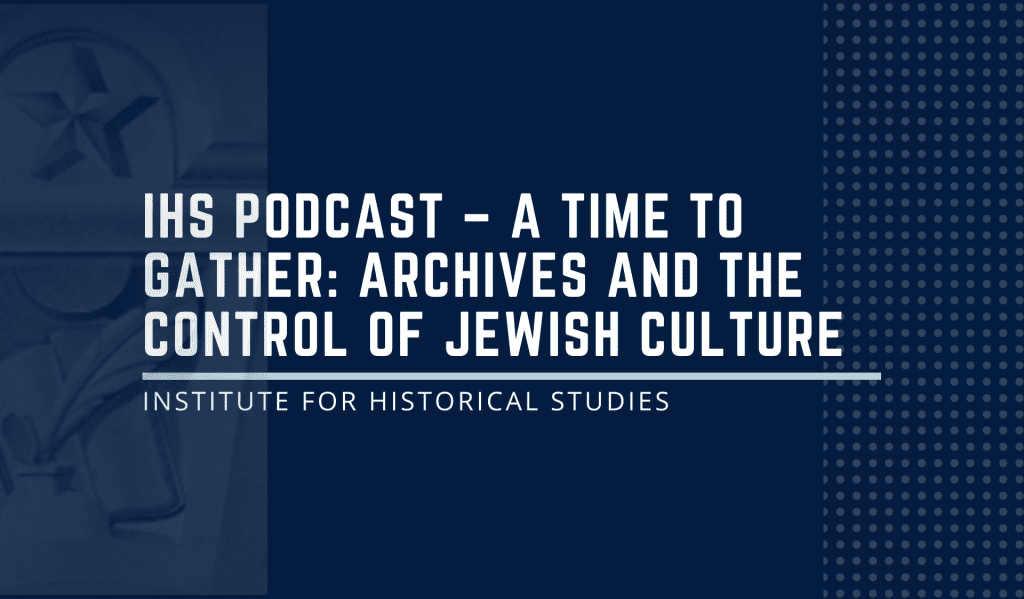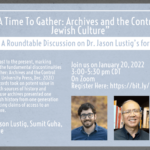
This episode of IHS podcasts highlights the work of Dr. Jason Lustig, Lecturer and the Israel Institute Teaching Fellow at the University of Texas at Austin’s Schusterman Center for Jewish Studies. The episode also features Dr. Cañizares-Esguerra, the Director of the IHS, and Ashley Garcia, a PhD Candidate in History at UT Austin. This podcast is recorded in connection with a roundtable, “A Time To Gather: Archives and the Control of Jewish Culture,” which will take place on January 20th. Details can be found here.
Introduction
What are modern archives? What work do modern archives do? How do archives establish “control” over cultural historical narratives? In his forthcoming book A Time to Gather: Archives and the Control of Jewish Culture, Jason Lustig seeks to answer these questions by looking at the making of four large, private, communal, Jewish twentieth-century archives.
The podcast explores how these archives created collections that very much responded to local agendas while in practice establishing global and normative narratives. This is one of the main “controlling” function of archives.
The Gesamtarchiv der deutschen Juden, the central archive of German Jewish History, inaugurated in 1903 a search for “totality” that has characterized twentieth-century archival epistemologies. The Gesamtarchiv was a peculiar private yet nationalist archive that shared with the Prussian German historical archives the aspiration to “totality,” namely, seeking to exhaustively cover the history of Central European Jews within the German imperial state dating back to the Middle Ages. Collecting the “total” history of Jewish communities in the Reich implied an act of centralization that paradoxically only fully succeeded once the Nazis took over. The Nazis sought to expand and secure the archive to identify Jewish individual lineages and communities.
The podcast also explores the history of The Jewish Historical General Archives in Jerusalem, first established in pre Holocaust Palestine and today known as the Central Archives for the History of the Jewish People. After the Holocaust, this private archive sought to recreate the Gesamtarchiv as part of Zionist aspiration for the total centralization of the documents of the global Jewish diaspora.
In addition, the podcast traces the history of the American Jewish Archives in Cincinnati that sought to secure photostatic copies of all decentralized holdings in American Jewish communities from Recife to Canada. Totality this time meant securing decentralization and survival in the atomic Cold War Age. The American Jewish archive reinforced a narrative of US imperial hegemony along the lines of Frederick Turner’s expansion of the American frontier.
The podcast ends with reflections on the Center for Jewish History in New York, which brings together a number of archives under one roof and carries forward this history of monumental collecting and raises questions about total archives in our digital age.
Seeking “control” and “totality” while bolstering nation-state narratives rendered all these four private and decentralized archival initiatives deeply contradictory.
~ Jorge Cañizares-Esguerra
Guest
Dr. Jason Lustig is a Lecturer and Israel Institute Teaching Fellow at the Schusterman Center for Jewish Studies at the University of Texas at Austin, where he’s also an affiliate of the History department. His first book, A Time to Gather: Archives and the Control of Jewish Culture, published by Oxford University Press traces the twentieth-century struggle over who might “own” Jewish history, especially after the Nazi looting of Jewish archives. Dr. Lustig is also the host and creator of the Jewish History Matters Podcast, which is online at JewishHistory.FM. He received his Ph.D. at the UCLA Department of History and has also been a Harry Starr Fellow in Judaica at Harvard’s Center for Jewish Studies and a Gerald Westheimer Early Career Fellow at the Leo Baeck Institute.
Hosts
Jorge Cañizares-Esguerra is Alice Drysdale Sheffield Professor of History at the University of Texas at Austin and the Director of the Institute for Historical Studies.
Ashley Garcia is a PhD candidate at the University of Texas at Austin. Her research includes 19th century political history, American communitarianism, and American political thought. Her dissertation, “An American Socialism: The Associationist Movement and Nineteenth Century Political Culture,” explores America’s most popular utopian socialist program: the Associationist movement of the 19th-century. Ashley has also completed a Portfolio in Museum Studies as her secondary PhD field.
The views and opinions expressed in this article or video are those of the individual author(s) or presenter(s) and do not necessarily reflect the policy or views of the editors at Not Even Past, the UT Department of History, the University of Texas at Austin, or the UT System Board of Regents. Not Even Past is an online public history magazine rather than a peer-reviewed academic journal. While we make efforts to ensure that factual information in articles was obtained from reliable sources, Not Even Past is not responsible for any errors or omissions.



